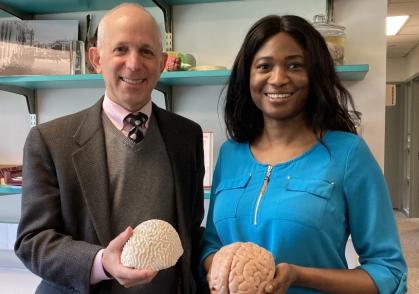Rutgers-Newark Research Team Compares Risk Factors for Alzheimer’s Disease Among African Americans and the Yoruba of Nigeria

Researchers from the School of Arts & Sciences-Newark (SASN) at Rutgers University have received National Institutes of Health (NIH) funding to explore interactions between genetic and lifestyle risk factors for Alzheimer’s Disease among African Americans and the Yoruba people of Nigeria.
Compared to most other groups in the U.S., African Americans are up to three times more likely to get Alzheimer’s. Rates for Africans are lower, but increasing annually. “This study is designed to shed light on the interplay between the biological, behavioral, and environmental factors that influence risk and resilience to Alzheimer’s disease,” said Dr. Mark Gluck, a Rutgers-Newark neuroscientist with the Center for. Molecular and Behavioral Neuroscience and the study’s principal investigator.
The cross-cultural study, in partnership with the University of Ibadan in Nigeria, is especially significant because people of African descent are underrepresented in biomedical research, said Gluck.
The study is a collaboration with Dr. Adesola Ogunniyi, a leading Alzheimer’s researcher at the University of Ibadan in Nigeria and a co-principal investigator. Ogunniyi hopes it will help explain rising rates of Alzheimer’s Disease among the Yoruba people, leading to better public health efforts and treatment.
“This is very important because of the devastating impact the disease has on the affected person, their family members and care providers, all of whom suffer along with the patient,’’ said Dr. Ogunniyi. “Improved information will help remove the stigma of Alzheimer’s Disease and promote health-seeking behaviors.’
Gluck’s team chose to compare African Americans with the Yoruba people of Nigeria because most Africans brought to the U.S. and enslaved in the mid 1800s were Yoruba. His subjects for the American half of the study are residents of the Newark, NJ area who were already enrolled in related research his team is conducting.
“We can expect some genetic similarities between the two groups,’’ said Dr. Gluck.

But cultural factors that impact health are very different. Although Yoruba culture has become more Westernized in the last few decades, compared to many Americans, the Yoruba tend to remain more active later in life, are less likely to be socially isolated, and have a healthier diet than most African Americans.
These behaviors can help maintain brain health and reduce risks for Alzheimer’s Disease according to Dr. Darlingtina Esiaka, a postdoctoral fellow in Gluck’s lab and a co-investigator of the study, who was born and raised in Nigeria.
Previous research by Gluck and colleagues has studied the effect of a variation on one gene, called ABCA7, that is found almost exclusively in people of African descent. “However, physical fitness, sleep quality, stress, and diet all interact with this and other genetic risk factors to affect one’s overall risk for Alzheimer’s disease,’’ noted Dr. Gluck.
The cross-cultural study, which received funding of nearly $350,000, is an extension of research Gluck began in 2016 with a nearly $7 million grant from NIH’s National Institute on Aging. The Newark-based study, known as “Pathways to Healthy Aging in African Americans,” enrolled about 400 local residents ages 60 and older who had no cognitive impairment when research began.
Gluck and his team follows them over time to measure the type of cognitive loss that can be a symptom of dementia. In addition to studying genetic factors, Gluck’s research centers on behaviors that can affect the onset of Alzheimer’s.
“A focus of our work has been on lifestyle variables: how we sleep, socialize, eat and move about in the world,” Gluck explained. “What differentiates people who have cognitive vitality and those who are declining early and moving toward dementia, and how can we help empower people to take steps in their daily life to reduce their risk for debilitating dementia that is the signature symptom of Alzheimer’s disease?”
To measure cognitive decline, Gluck’s team uses brain imaging technology and has developed novel tests that reveal signs of dementia years before symptoms appear. “The goal is to slow the progression of cognitive decline,’’ said Esiaka. “We want to know who is most likely to convert from being healthy to having Alzheimer’s Disease in the coming decade so we can start interventions, such as medication and lifestyle changes, before it is too late.”
The NIH funding will support sending Rutgers-Newark students and postdoctoral fellows from Rutgers to Nigeria to help establish research collaborations with doctors and students at the University of Ibadan. For the summer of 2023, Gluck and Esiaka plan to select several Rutgers University-Newark undergraduate students to work on the project as an international scientific and educational training experience. These students are likely to include those majoring in Neuroscience & Behavior, ideally combined with co-majoring or minoring in African and African American Studies.
“This would allow students to make visible the kinds of connections we talk about in African and African American Studies, which are usually looked at from a humanistic and social science perspective,’’ said John Keene, who chairs the department. “We see how profoundly the research they’re introduced to in our classes intersects with the kinds of research that Dr. Gluck’s team is doing.’’



